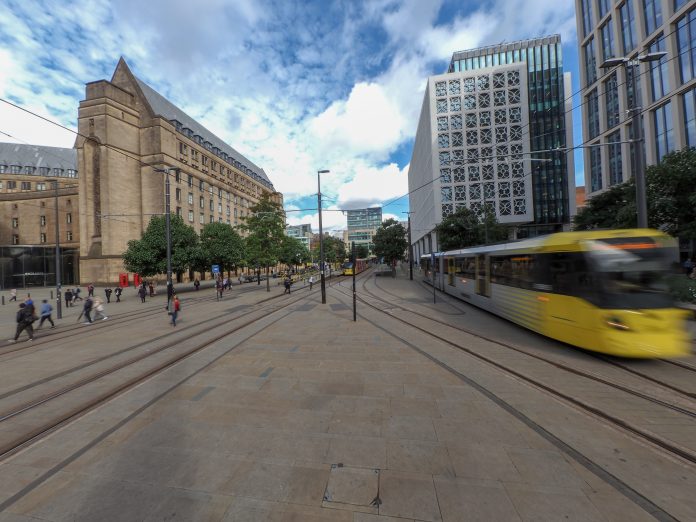Greater Manchester’s leaders announced an environmental vision for the city-region, despite ongoing national Brexit uncertainty
The Greater Manchester Transport Strategy 2040 envisions a cleaner air environment via the reduction of CO2 emitting daily trips. Greater Manchester’s vision is that by 2040, half of all daily trips in Greater Manchester will be made by public transport, cycling and walking, especially those shorter journeys around local neighbourhoods. The city’s travel infrastructure alone will undergo 65 projects, such as a new tramline linking to Trafford Park and multiple improved services. This will mean a million more trips each day using sustainable modes of travel.
A coordinated plan to bring levels of nitrogen dioxide (NO2) within legal limits is currently being developed by all 10 local authorities in Greater Manchester, working closely with GMCA and TfGM.
Andy Burnham, Mayor of Greater Manchester, gave a speech to the Combined Authority press conference on the 7th January 2019, on key issues such as homelessness, affordable housing, environmental concerns and the youth of the city:
“The new GMSF proposes a deadline of 2028 for all new development here to be zero-carbon and a new GM-wide policy of opposition to fracking.”
“In turn, these policies support the proposal that will go to our Green Summit in March of a
carbon-neutral Greater Manchester by 2038.”
“By embracing the future ahead of other areas, we will not only clean up our air and our
environment, we will become a global leader in the green, clean economy.”
“Together, we are harnessing the full power of the most advanced devolution deal of any city-region in England for the benefit of our three million residents. And we are putting together the pieces of the jigsaw to reveal the big picture – a Greater Manchester where prosperity, opportunity, health, hope and happiness are widely and fairly shared across all our people and places.”
“There is no reason why the place which led the first industrial revolution cannot lead the fourth.”
“We are a city-region with a radical spirit in our DNA – we have always delivered industrial innovations whilst never forgetting the people that power that economy.”
Whilst Andy Burnham delivered promises to the future of the city-region, Liberal Democrats contested the intentions of the Greater Manchester Leadership. The Manchester Liberal Democrat Planning Spokesperson, Greg Stanton, highlighted a controversial investment into fracking by the Labour councils in October 2018:
“The GMCA have said that at this time they do not support fracking, however, that’s simply not true. In October last year, the Liberal Democrats revealed that Labour councils in Greater Manchester were investing £1bn into the fracking industry.”
“Climate change is one of the biggest threats we face and rather than leading the fight for our environment, councils in Greater Manchester are investing in the most unpopular, dirtiest and most damaging industry imaginable.”
“Imagine the difference this £1bn could make if redirected into renewable and clean energy.”
“We called on leaders in Greater Manchester to work across parties to implement our plans to fight back against air pollution but our ask for something as simple as more air quality monitors were ignored.”
Councillor Alex Ganotis, Portfolio Lead for Green City Region, in a report for upcoming 11th January GCMA meeting which will discuss clean air legislation, said that:
“Long-term exposure to elevated levels of particulate matter (PM2.5, PM10) and NO2 may contribute to the development of cardiovascular or respiratory disease, and may reduce life expectancy.”
“The youngest, the oldest, those living in areas of deprivation, and those with existing respiratory or cardiovascular disease are most likely to develop symptoms due to exposure to air pollution.”
This relationship between financial deprivation and exposure to air pollution, means it is not possible to discuss clean air initiatives without looking at the leadership stance on social housing. Burnham decides to allocate 30,000 out of 50,000 incoming new housing developments to “affordable housing” – a move questioned by the Liberal Democrats, who highlighted luxury flat developments which dominate Central Mancunian skyline with the red lights of cranes.
Ganotis’ informational report on clean air brought to light that Greater Manchester is in talks with the World Health Organisation (WHO) to become a ‘BreatheLife’ city, which would provide an additional clean air quality target for 2030.
There was little mention of Brexit’s impact upon the city-region in regards to environmentalism or current status of being in violation of clean air regulations. Whilst the Liberal Democrats protested Burnham’s perceived hypocrisy in their environmental vision, they made it clear they would be available to work on preventing climate change and increasing affordable housing.
“We do, however, look forward to working together to implement progressive policies to tackle this global crisis.”











